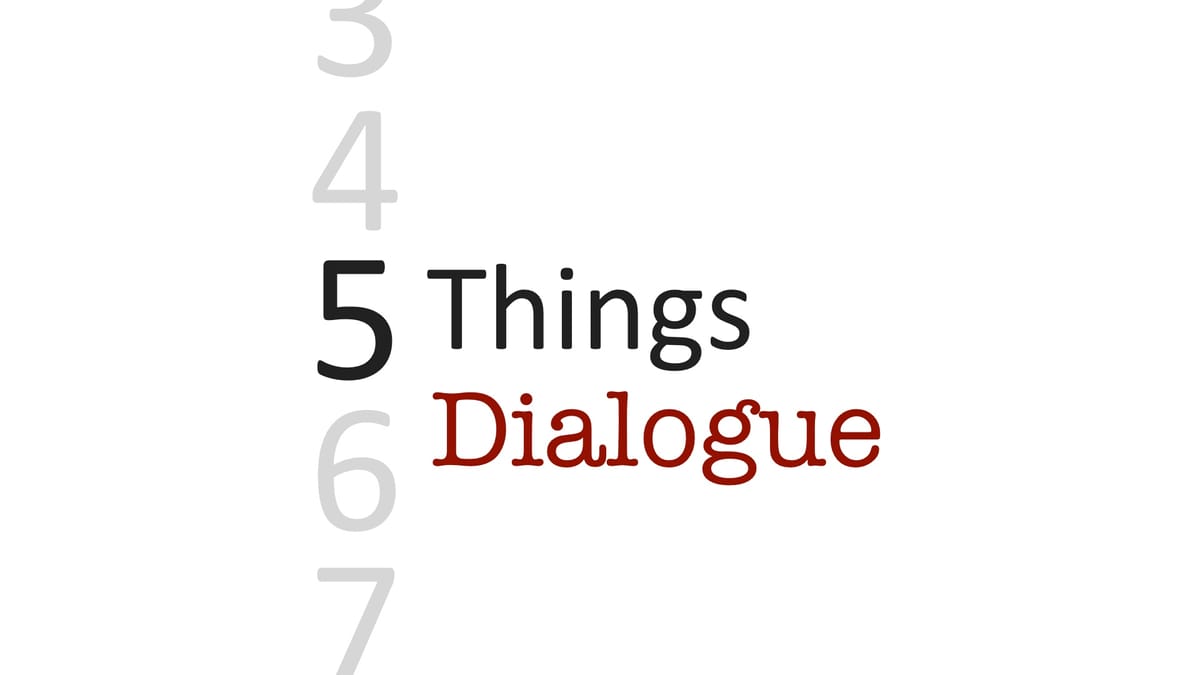Five ways to improve your Dialogue
The challenge is always the same. We must control the puppet strings of these characters so they perform the needs of the scene yet create the illusion of genuine agency.

The Story and Plot Weekly Email is published every Tuesday morning. Don't miss another one.
"Acting is behaving truthfully under imaginary circumstances."--Sanford Meisner
This is true. Of course, it's true. Do you think I am going to argue with Sanford Meisner about acting?
But it is also true for us, the writers.
When it comes to our characters, our job is to get them to behave truthfully under imaginary circumstances.
And few things expose the artifice of dramatic storytelling faster than bad dialogue.
The challenge is always the same.
We must control the puppet strings of these characters so they perform the needs of the scene yet create the illusion of genuine agency.
As if they are truly making these choices themselves.
This is what we mean by emotional truth.
The Parameters
Everything serves the story. The sequence. The scene. The moment.
Everything we write has a job.
Including dialogue.
Understand this first. Dialogue serves the scene.
Even when establishing character with that dialogue, that becomes part of why the scene is in the story.
This is where our decisions start.
What needs to happen in the scene?
What changes? What is true at the end of the scene that was not true in the beginning?
Dialogue contributes to this in two ways:
To help make this change happen truthfully.
The utmost importance of this cannot be overstated. We must believe what we see on screen. One false moment loses the audience.
And you don't always get them back.
To help make this change happen in a compelling way.
This is through whichever emotion you're trading on. Whether it's fear, tension, laughs, adrenaline, romance, hope, or whatever emotion you want to evoke.
If your dialogue isn't contributing to one of these two things, it might be worth asking if it needs to be there.
Through the lens of these parameters, keep the following five things in mind when writing dialogue.
1. What does the character want?
The all-important questions:
- What does the character want?
- What are they willing to do to get it?
This is what dictates your choices in the scene. Everything they say should, in some way, reflect these two answers.
DO NOT FORGET THAT SECOND PART.
What they are willing to do to get it is often the internal obstacle to the character getting what they want.
This is especially true in relationships, as people do not want to leave themselves vulnerable to feeling hurt.
They may want satisfaction, but not enough to reveal how they feel.
A character withholding information from others is a tactic. Conscious or not. This tactic creates subtext.
Know WHY a character says what they do.
And "I need them to say this for the story" is not an answer.
It very well may be true!
But it's not a good answer. You have to motivate the character to say it.
2. Listen and react.
This is usually where emerging screenwriters could see the most improvement.
As an old actor myself, one of my favorite compliments is when an actor tells me my dialogue is so damn easy to memorize.
There is no secret here. I have no special talent for this. I just make sure the characters listen and respond to each other.
Each line of dialogue is a reaction to what just happened or what was just said.
And if it's not, if a character is not bothering to listen to what was just said, that's a unique moment in itself!
Because each line is a natural response to the previous line, it's easy to remember it!
Action. Reaction. This gives the scene LIFE.
Each moment motivates the next, which makes it feel like a spontaneous response that could not exist without the moment before it.
So ask yourself, is each line of dialogue a response to the moment before it?
If it is not, does that fact require a reaction of its own?
Are your characters listening to each other?
3. Rhythm.
It's not an accident that many of our best writers come from the theatre. Why? Because they were able to explore longer scenes and develop a sense of rhythm in their work.
Before the film school generation, this was also true for live television. The rhythm of scenes came from the writing and not the editing.
But on the page, it's all you.
The back-and-forth rhythm of dialogue isn't just an affectation. Life has rhythm. A conversation has rhythm.
When things are working well, they are "in rhythm," and when something lacks rhythm, it's a sign that something is wrong!
Just like music can evoke emotion, so can the rhythm of a scene. Both good and bad. We can feel the energy and what direction it's going.
Nothing reveals the rhythm faster than hearing a screenplay out loud.
You'll notice little things. The lack of rhythm reveals its contrivance. There is nowhere for a person to breathe, so it rings untrue.
If it's difficult for the writer to get it out of their mouth, it will be impossible for an actor.
The timing of comedy or a biting reply is everything.
You know when people tell you to listen to other people's conversations to help your dialogue? The best thing you can take from that is the rhythm of those conversations.
That's the right lesson from that exercise.
The wrong lesson? Trying to capture how people "really talk."
Which brings me to:
4. We want truth, not realism.
Drama is not reality. It's hyper-reality. Even "reality television" is hyper-reality.
We don't want reality in our entertainment. We want emotional truth. We want what rings true and makes us feel.
And what we perceive as reality can often get in the way of that.
Reality is full of stuttering and filler words like "uh," "you know," and "like." It's people who can't quite get to the point and who ramble on and on, and the people around them are too polite to put a stop to it.
Certainly, there are moments we choose to use these things for effect, but when we try to utilize them to make things "real" we disrupt more than we enhance.
Yes, we need to believe what we see. This is fundamental to what we do.
But we also need to be entertained.
We never want to be bored.
Emotional truth is required for this. Reality will often undermine it.
As any actor will tell you, those filler words don't help. They just get in the way.
So yes, a character will be dumber than a person really is. They will be smarter and more quick-witted than a normal person really is.
They will be more articulate and more in touch with their emotions than a person really is.
That's fine. That's good.
We just need to make sure we believe it
Because emotional truth is more important than realism.
5. Less is more.
Our initial instinct is almost always to explain more than we need to.
The audience knows they're eavesdropping. They want to be eavesdropping.
There is an adage in public relations and politics, "if you're explaining, you're losing."
A certain amount of that applies here.
The moment the audience feels like a line of dialogue is for them rather than an honest exchange, they feel betrayed.
So trust the audience. They pick up plenty. When characters behave as if something is true, the audience will figure it out.
You do not have to explain everything. And you certainly don't have to explain it through dialogue.
You are looking for the minimum effective dose in your dialogue.
What is the minimum writing you need to express the feelings of the character, their want, their POV, and the needs of the scene?
That's what you're targeting.
Don't forget to have fun.
Action lines can be a grind. There is a precision there that can wear you out. And how you write an action line is a different skill than first conceiving what happens in the story.
Not so with dialogue.
Dialogue is exactly what you imagine the character saying on screen.
This is as direct an entry into the reader's mind as you will ever get.
So go all out. Have fun. Be emotional. Write great lines that make an actor want to play that role.
Just make sure it’s truthful.
The Story and Plot Weekly Email is published every Tuesday morning. Don't miss another one.
When you're ready, these are ways I can help you:
WORK WITH ME 1:1
1-on-1 Coaching | Screenplay Consultation
TAKE A COURSE
Mastering Structure | Idea To Outline

